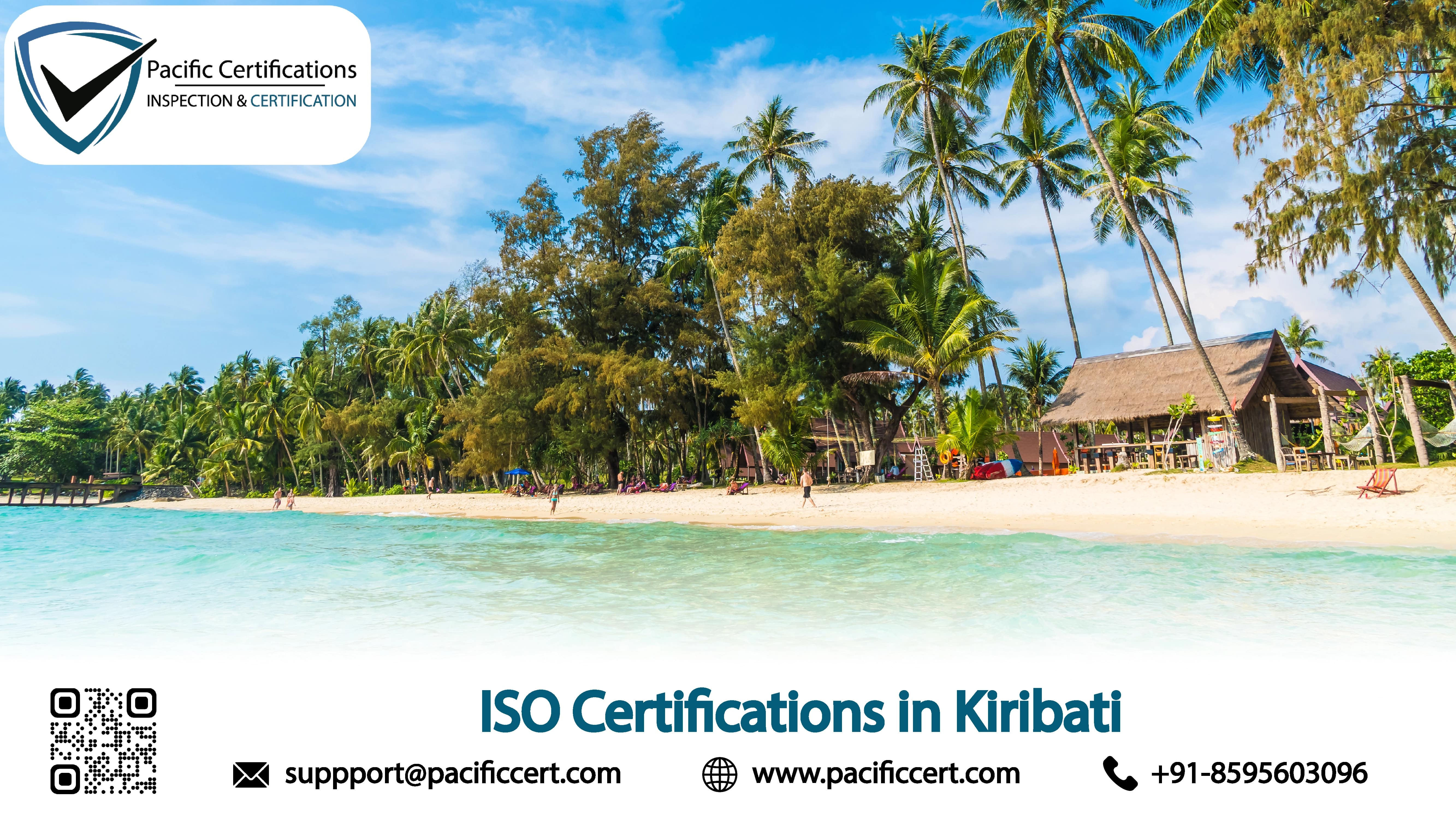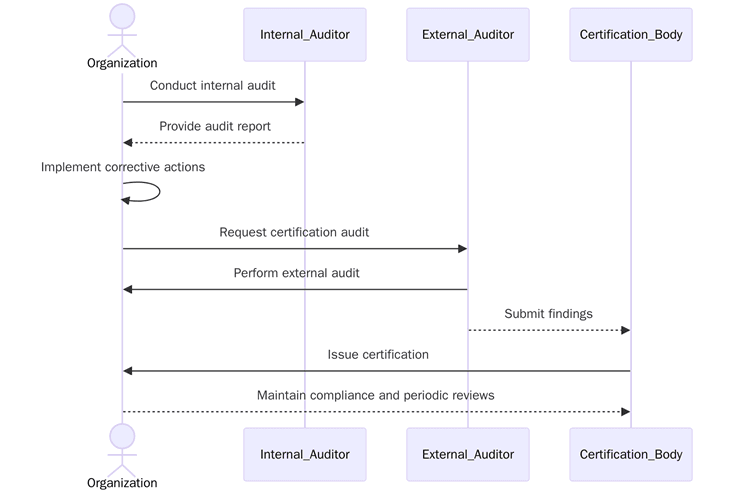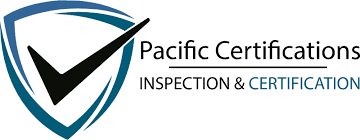ISO Certifications in Kiribati, Popular Standards, Requirements and Benefits

Introduction
Kiribati’s economy is centred on fisheries and marine products, small-scale agriculture, inter-island logistics, public utilities, construction, tourism and a growing telecom/ICT and financial services base around South Tarawa. By adopting standards such as ISO 9001 (Quality Management), ISO 14001 (Environmental Management) and ISO 45001 (Occupational Health & Safety), companies in Kiribati can improve efficiency, reduce waste and earn trust from partners and regulators. For expanding areas like ICT, construction and fisheries, ISO certification has become a practical step toward attracting development partners, winning tenders and competing confidently in regional markets. These programs help organizations prove reliable quality, safer worksites, environmental stewardship, secure information and resilient operations, signals recognised by government buyers, donors and export customers across the Pacific.
Contact Pacific Certifications to apply for ISO certification in Kiribati, we’ll issue an accreditation-backed proposal with scope, audit days, timelines and a fixed fee.
Economic Context & Industry Overview
Kiribati comprises widely dispersed atolls where logistics, energy and water constraints shape how organizations operate. Fisheries, cold-chain handling and public services dominate formal activity; construction and tourism add seasonal peaks; and improved connectivity is unlocking more ICT-enabled services. Across these sectors, procurement teams and funders increasingly expect auditable management systems for quality, safety, environment and information security as a baseline for vendor approval and grant/loan due diligence.
Why ISO certifications matter in Kiribati?
Government tenders and development-partner projects require verifiable systems and evidence of control. For fisheries and cold chain, HACCP-based programs reduce spoilage and strengthen acceptance with regional buyers. Utilities and public services use ISO to structure governance, incident learning and performance tracking that withstands external audit. Banks, telecoms and registries use ISO/IEC 27001 with ISO 22301 to reassure customers and regulators that data is protected and services remain available through cyclones or network disruptions. Certification also organizes records, policies, KPIs, competence, risk files and corrective actions, so inspections and financing reviews move faster and more predictably.
Popular ISO Standards in Kiribati
Industry focus | Commonly requested standards | Why they matter |
Fisheries, cold storage, export handling | ISO 22000 / FSSC 22000, ISO 9001 | HACCP discipline, temperature/traceability control, buyer acceptance |
Public utilities (water, power), waste & environment | ISO 9001, ISO 14001, ISO 45001, ISO 22301 | Service reliability, environmental compliance, safety, continuity |
Telecom/ICT, banking, public registries | ISO/IEC 27001, ISO 22301, ISO/IEC 20000-1, ISO/IEC 27701 | Security, continuity, IT service quality, privacy governance |
Construction & contractors, facilities | ISO 9001, ISO 14001, ISO 45001 | Quality of works, site safety, environmental care |
Tourism & hospitality, transport & logistics | ISO 9001, ISO 14001, ISO 45001 | Consistent service, waste and emissions control, safe operations |
Public agencies & education | ISO 9001, ISO 27001, ISO 22301 | Service standards, information trust, continuity of services |
Certification Process in Kiribati
Preparation starts with an honest view of how work runs today and how evidence is captured. The aim is to make your system auditable without reinventing daily routines. Below are the steps to consider:
• List products services sites headcount and high-risk processes for clear scope
• Map processes end to end to show handoffs records and responsibilities
• Set policy and measurable objectives linked to customer and legal needs
• Assemble evidence packs for production maintenance labs IT and logistics
• Train process owners keep competence matrices and attendance records current
• Calibrate instruments verify methods and file certificates for quick checks
• Run internal audits that sample high-risk tasks and supplier interfaces
• Hold management review with KPIs audit results complaints legal updates and actions
• Schedule Stage 1 for readiness and Stage 2 for implementation verification align multi-site sampling to risk
• Blend on-site checks with remote interviews where suitable to reduce travel time
• Keep permits licenses and regulatory reports organized for quick verification
What are the requirements of ISO Certifications in Kiribati?
Start by grounding your system in how work actually happens on boats, in plants, clinics, depots, data rooms and island offices and align controls with local norms so evidence stands up in audits, inspections and buyer reviews; below are the key requirements:

- A defined scope aligned to products/services, processes and island sites (single or multi-site).
- A documented management system with controlled procedures and records that match practice (right-sized for small teams).
- A risk register with operational controls for real hazards (cold-chain breaks, marine safety, storm surge, data loss) and change management.
- Competence matrices and training records for process owners, shift leads and first responders.
- Internal audits with reports, nonconformities, root-cause actions and verified closures.
- Management review with inputs (KPIs, audits, incidents/complaints, legal updates) and recorded decisions/actions.
- Standard-specific artefacts: HACCP studies & CCP logs (ISO 22000), Statement of Applicability & risk files (ISO/IEC 27001), HIRA & PTW (ISO 45001), aspect-impact registers & objectives (ISO 14001), energy review & EPIs (ISO 50001).
- Legal/other requirements register with permits, inspections, calibrations, monitoring data and supplier compliance evidence.
Tip: Align with fisheries/export hygiene expectations, marine and OSH rules for crews and ports, atoll-specific environmental/waste practices, public-sector records duties and privacy controls for citizen/customer data; keep calibration certificates, temperature/transport logs, generator and backup/DR tests ready for sampling.
What are the benefits of ISO Certifications in Kiribati?
Use certification to pass buyer checks, secure donor-funded project acceptance and stabilise operations across multiple islands; below are the key benefits:

- Faster prequalification in government and development-partner procurements
- Reduced incidents, defects, cold-chain breaks and unplanned downtime
- Clear roles and training paths for high-risk tasks (marine handling, chemicals, electrical, data)
- Traceable records for warranty, claims, ESG and due-diligence questionnaires
- Better supplier oversight through audits, KPIs and corrective actions
- Measurable gains in energy use, waste, emissions, uptime and yield
- Stronger brand signals for Pacific, Australia/NZ and Asian markets
Two medium-term drivers (2027–2030) will shape certification demand. Fisheries and food control will remain the backbone of export earnings, with buyers expected to tighten hygiene, traceability and cold-chain verification through the decade. That pressure will continue to push ISO 22000/FSSC 22000adoption to systematize HACCP, temperature integrity and supplier controls across fleets, landing sites, and cold stores. Connectivity upgradesare poised to shift the services mix as new subsea capacity becomes fully operational and utilization scales; higher-quality bandwidth will enable more data-reliant banking, telecom, and e-government services. As these platforms formalize SLAs and incident obligations, organizations are likely to expand ISO/IEC 27001 (security) and ISO 22301 (continuity) to satisfy risk, availability and auditability requirements across dispersed island operations.
Challenges Faced in Kiribati
Operational, regulatory and evidence-readiness issues related to getting certified can cause delays—budget constraints and staffing gaps, incomplete or outdated documentation and records, weak internal audits and corrective actions, supplier-control gaps, multi-island sampling and travel logistics, calibration and permit backlogs and data/privacy mapping for ICT; below are the key challenges:
- Budgeting for certification fees, auditor time and system maintenance
- Perception of ISO as compliance rather than a performance tool in some teams
- Shortage of experienced internal auditors/system owners outside South Tarawa
- Document control gaps and slow closure of corrective actions
- Multi-site sampling and inter-island logistics impacting schedules and evidence quality
What is the cost of certification in Kiribati?
Certification fees are confirmed after scoping and reflect headcount and risk, the number and dispersion of island sites, your standard set (single vs. integrated like 9001+14001+45001), sector sampling depth (e.g., cold chain or utilities vs. offices) and travel/logistics to outer islands. Your proposal itemizes Stage 1, Stage 2 and surveillance days, clarifies on-site versus remote activities and notes any multi-site efficiencies so budgets remain transparent and predictable.
For personalized quote, contact [email protected].
What is the timeline for certification in Kiribati?
Timelines depend on document and record readiness, the speed of closing any Stage-1 gaps, single- vs. multi-site scope and whether you are certifying one standard or an integrated program. Coordinating audit windows around sailings/air schedules, seasonal production, or utility works and blending on-site with remote interviews—also affects duration. A well-prepared single site can move from application to decision within one audit cycle; multi-site or integrated scopes usually require additional planning and sampling time.
How Pacific Certifications can help?
Pacific Certifications audits and certifies ISO management systems for fisheries and cold-chain operators, public utilities and environment/waste services, telecom/ICT and banking, construction and facilities, tourism and hospitality, logistics and ports and public agencies across Kiribati. We work under recognized accreditation with transparent pricing and an experienced local team that understands site realities and buyer expectations. Our certificates are accepted by procurement portals and international customers and we are recognized by ABIS.
Request your ISO audit plan and fee estimate. We will help you map Stage 1 and Stage 2 timelines and evidence requirements for your organization. Contact us at [email protected] or visit www.pacificcert.com.
Accredited Training Programs
Pacific Certifications provides accredited training programs in Kiribati for ISO 9001, ISO 14001, ISO 45001, ISO 22000/FSSC 22000, ISO/IEC 27001, ISO 22301 and ISO/IEC 20000-1.
· Lead Auditor Training: for professionals auditing these systems across Kiribati’s industries and public services.
· Lead Implementer Training: for personnel establishing or improving systems in plants, ports, utilities, hospitals, logistics and ICT platforms.
These programs are conducted online or onsite, depending on client needs under ISO/IEC 17024 for personnel certification.
To begin the process or request a quotation, contact us at [email protected] or visit www.pacificcert.com.
Our team will guide you through the audit and certification process and planning stages specific to your operations in Kiribati.
Ready to get ISO certified?
Contact Pacific Certifications to begin your certification journey today!
Suggested Certifications –
Read more: Pacific Blogs

